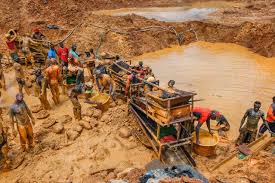Illegal mining, commonly known as galamsey, has devastated Ghana’s water bodies, creating an environmental crisis with far-reaching consequences for the country. Rivers and streams that once served as vital sources of water for millions are now poisoned, threatening livelihoods, public health, and the nation’s food security.
The once-clear rivers like the Pra, Offin, and Ankobra are now contaminated with mercury, cyanide, and other harmful chemicals used in gold extraction.
These toxic substances, seeping into water supplies, have rendered once-drinkable water dangerous, forcing communities to rely on expensive, imported alternatives or untreated water sources, leading to increased waterborne diseases.
Farmers, who rely heavily on these rivers for irrigation, have been hit hardest. Crops are failing as access to clean water dwindles, leading to food shortages and escalating prices. With agriculture being a backbone of the economy, the country is seeing a growing food security challenge, with rural and vulnerable populations bearing the brunt.
Beyond agriculture, the collapse of fishing industries in affected areas is eroding livelihoods, pushing more people into poverty. Fishermen are finding their catches diminishing as pollution destroys aquatic ecosystems, including vital fish breeding grounds.
Public health experts warn that the long-term effects could be devastating, as exposure to toxic chemicals from galamsey is linked to kidney damage, birth defects, and other serious health conditions.
The government’s attempts to curb illegal mining have so far fallen short, with weak enforcement, corruption, and the involvement of influential figures in these illicit activities stalling progress.
The destruction of Ghana’s water bodies is not just an environmental issue, but a threat to the nation’s survival. Without urgent and decisive action, the consequences will only worsen, pushing the country into deeper ecological, economic, and social turmoil.
Source:enviromentalguidenews.com

